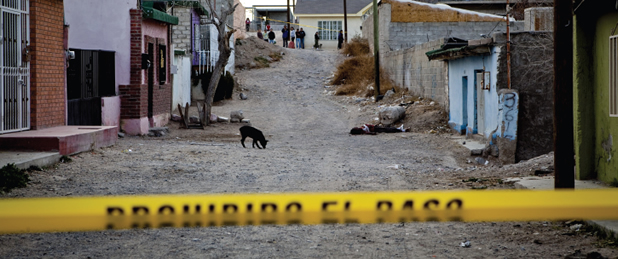Five Questions: Guns, Growth and Elections in Mexico

George Grayson teaches Government at the College of William and Mary. He is a senior associate at the Center for Strategic and International Studies and an associate scholar at the Foreign Policy Research Institute, and author of the Great Decisions 2012 article Mexico: transborder crime and governance. He spoke with Sarah Marion Shore about the current state of play in Mexico.
1. What is at stake in Mexico’s upcoming election? Could the PRI party, known for its years of often autocratic and corrupt rule, return to power?
We don’t know about the future of the PRI, one hopes that they’ve learned lessons, especially about economic management, because in the past the PRI was associated with a large welfare state, huge budget deficits, and balance of trade shortfalls. The likely winner, Enrique Peña Nieto, is advised by one of the best economists in Mexico; he seems to have a good team and is eager to increase Mexico’s economic growth, which will probably approach 3.5 percent this year.
All elections are important, but this one is especially vital because the drug cartels have killed more than 40,000 people during the term of the incumbent, Felipe Calderón. it remains to be seen whether the next chief executive continue to deploy the armed forces --that is brandish the broadsword against the underworld organizations or wield the scalpel-- that is, rely more on intelligence, eavesdropping, spies, drones, and other technological means to try to reduce the violence , which is the number-one issue on the minds of Mexican voters.
The second approach is preferable, size, power, wealth, and cruelty of the cartels makes it quite difficult to remove the military from the of confrontation. In addition, Mexico doesn’t have honest, effective police forces, and without reliable law-enforcement agencies it’s extremely difficult to wage a successful conflict against the cartels. Soldiers are taught to pursue, to capture, and to kill, and they really don’t have the sophistication to work with civilians that is required of first-rate police officers.
2. As President Calderon’s term comes to a close, how effective has his War on Drugs been? Is there more or less violence in Mexico today than six year ago?
There’s clearly much more violence; if I were grading him I would give him a D or a D+. He has concentrated on the kingpin theory, that is, he’s gone after the capos [leaders] of the cartels, and has registered some success, especially with the Tijuana, Gulf, and Juárez cartels, as well as the Beltrán Leyva Organization. However, every time you kill or incarcerate a cartel big shot his lieutenants scramble for power, rival cartels invade the turf of the deposed Chief, and gangs associated with the crime syndicate lunge for more power. While providing trophies for President Calderón, kingpin theory has really sparked more violence.
3. Illegal crossings over the U.S.-Mexico border are at their lowest levels in 40 years, and reports show a steady decline of legal immigration in the past 5 years. Why are fewer Mexicans immigrating to the United States?
That’s true and it’s a related to the high unemployment north of the Rio Grande and more enforcement at the border. But the enforcement is secondary, when there are a lot of jobs available then you will find Mexicans, Central Americans, and others attempting sneak across the border. For the moment, the the word on Main Street Mexico is that the jobs are scarce in El Norte plus the U.S. government will pursue illegal aliens.
4. Mexico’s economic growth has been strong given the global recession, yet many fear security concerns could slow burgeoning industry. How significantly has violence in Mexico impacted its crucial tourism industry and what is the current state of the economy in general?
The economy’s growing at between 3.5 and 4 percent. Tourism is down, but investment is increasing despite the narco violence. Meanwhile, a key factor for Mexico’s future is oil, which generates a third of the national budget. Mexico has been fails to enter into “risk contracts,” which means that an oil company comes in, undertakes exploration and drilling, and, if it turns up a dry hole, walks away much poorer. On the other hand, it successful, the private firm is entitled to a portion of the oil and gas it removes from the bowels of the earth. Mexico has oil off-shore and needs to engage in risk contacts, but that’s an extremely volatile political issue. It’s imperative that the next president move towards allowing outside companies to undertake operations in the country. Absent this change in policy, will became a net importer of oil within ten years.
5. Despite increasing violence, Mexico has made significant democratic strides, and the economy does seem to be growing. Generally, is day to day life better or worse for Mexican citizens than it was 10 years ago?
It really depends on where you live. If you’re a middle class, university graduate in Mexico City, your life is probably better. If you’re in one of the killing grounds, such as Ciudad Juarez, Monterrey, or Matamoros you are reluctant even go out in the streets in the evening. I think it’s wrong to call Mexico a democracy. Because even though its elections are relatively clean, possibly more transparent than in the United States, Mexico’s incumbents are unwilling or incapable of advancing policies to improve the wellbeing of thirty-five to forty percent of Mexicans live in abject poverty. Fair elections are important, but they must be complemented by legislation to create jobs, improve health-care, promote regional development, and overhaul the public education system.
Buy the Great Decisions 2012 Briefing Book





